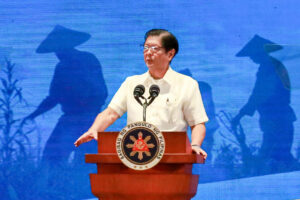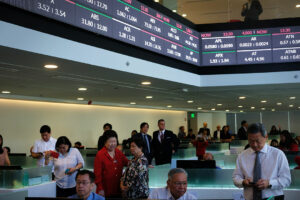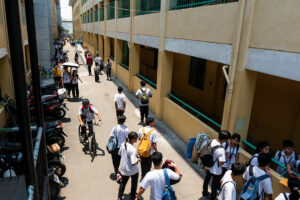By Chloe Mari A. Hufana, Reporter
PHILIPPINE President Ferdinand R. Marcos, Jr., on Thursday called for region-specific wage increases, bucking the labor sector’s call for a P150 to P200 legislated pay hike to keep up with inflation.
In a Labor Day event in Pasay City, the President said pay increases should be studied carefully because they affect businesses, jobs and the economy.
“We hear the call of our workers for better wages and assure you that your concerns are being addressed through the Regional Tripartite Wages and Productivity Boards (RTWPBs),” he said. “The government stands firm in its commitment to protecting and advancing workers’ welfare while promoting inclusive economic development.”
Since June 2024, 16 regions in the country have implemented minimum wage increases. Twenty-eight wage orders have been approved, including pay hikes for domestic workers.
Meanwhile, the Labor department said Metro Manila’s wage board would start reviewing entry-level pay rates this month, as the next minimum wage determination cycle begins.
“The National Capital Region (NCR) will be the first to begin its wage review this May 2025,” Labor Assistant Secretary and Bureau of Local Employment chief Patrick P. Patriwirawan, Jr. said in a Viber chat in Filipino.
“Per the President’s directive during the 2024 Labor Day for a timely review of minimum wage rates, our RTWPBs ensured to begin the review of minimum wage rates within 60 days from the anniversary date of their latest wage order,” he added.
NCR, which has the highest cost of living, also has the highest daily minimum wage of P645 for nonfarm workers. The last pay hike in the capital region took effect in July last year.
In contrast, regions such as the Bangsamoro Autonomous Region in Muslim Mindanao (BARMM) have considerably lower minimum wages, with rates for agricultural workers as low as P316.
On Feb. 19, 2024, the Senate approved a bill for a P100 daily wage increase for all minimum wage earners in the private sector, regardless of region or industry. In January, the House of Representatives labor committee endorsed a consolidated bill proposing a P200 across-the-board daily wage increase for private sector workers.
Labor groups decried the stalled legislated wage hike, arguing that it would help Filipinos cope with the rising cost of living, even if inflation has eased to 1.8% in March, the lowest in almost five years.
Kilusang Mayo Uno and allied organizations in a statement called for a daily minimum wage of P1,200, an amount calculated by think tank IBON Foundation as the minimum needed to adequately feed, clothe and shelter a family of five.
It said the increase is a matter of justice.
The group also challenged candidates in the midterm elections on May 12 to implement a living wage as a priority policy.
Meanwhile, the Federation of Free Workers (FFW) renewed its call for reforms through a collective political initiative branded as the “Labor Vote.”
With less than two weeks before the elections, FFW President Jose Sonny G. Matula and allied unions sought to transform workers’ longstanding grievances into political power.
In a separate statement, Mr. Matula decried the government’s failure to engage organized labor in dialogue, accusing the government of ignoring key demands such as living wages, union rights, public service reform, wealth taxation, climate action and anti-corruption measures.
“The system favors the rich,” Mr. Matula said, blaming elite-dominated politics and big business for marginalizing labor and eroding democratic institutions.
He said the lack of meaningful engagement with workers, especially Mr. Marcos’s alleged failure to meet with labor groups since taking office, has deepened inequality and public disenchantment.
Labor groups are pushing a nine-point agenda centered on social justice, sustainable development and political accountability.






